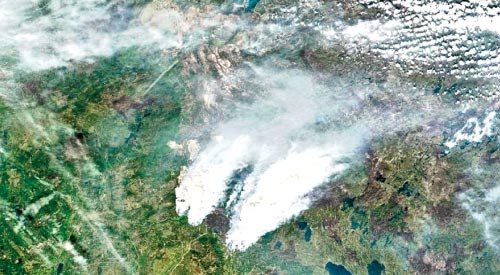|

Best Editorials
by Junior Reader Teens
Thanks to all those Teens who wrote in your 'Editorial' on the subject
"Protecting the Environment?" We publish today the best `Editorial' opinions.
PLEASE READ and see what corrections we have made so that you can learn and
improve your language, facts and style. Sometimes we may delete a section that
is incorrect or not good for harmony.
 Harvard’s
youngest ever graduate Harvard’s
youngest ever graduate
Eugenie de Silva, 18, of Sri Lankan origin residing in USA, is the youngest ever
Harvard University graduate in any field. She presented her first reference book
titled ‘National Security and Counter Intelligence in the Era of Cyber
Espionage’ to President Maithripala Sirisena, recently.
Eugenie graduated with her second Master’s degree at 16 years, which she started
at just age 13 at Harvard University. She now holds a Master of Liberal Arts in
Extension Studies with a concentration in Legal Studies.
Eugenie had her first world record at age 14, as the world’s youngest person to
graduate with a Bachelor’s degree in Intelligence Analysis with a perfect 4.0
GPA (Summa Cum Laude) in May 2013 from the American Military University.
She earned her second world record when she was recognized as the world’s
youngest to earn a Master’s degree in Intelligence Studies, once again with a
4.0 GPA from the American Military University in May 2014 at 15 years.
She is also the youngest person to read for a Ph.D from a university in UK. At
age 15, Eugenie began her Ph.D. in Politics at the University of Leicester,
England and is also the world’s youngest student in its Department of Politics.
She was also named one of the top 30 Thinkers Under 30 by the Pacific Standard
Magazine.
Protecting the Environment
Opinion 1
The environment consists of rivers, seas, waterfalls and natural surroundings
which are important to mankind. It provides us with shelter, medicine, habitats,
food etc. and makes earth a suitable place to live. Harmful effects are caused
to the environment by pollution, soil erosion and droughts which result in acid
rain.
People harm the environment in many ways by disposing waste material in rivers,
releasing smoke and toxic gases into the air and throwing garbage on the
streets.
Hydro power stations are an alternative to nuclear power stations. Some
countries recycle polythene, plastic and glass.
My dear brothers and sisters, let's make it our mission to give Sri Lanka a
green solution and protect the earth.
Chiran Ravindu Dharmarathne,
Grade 6,
Lyceum International School,
Gampaha.
Opinion 2
The natural surrounding is called the environment. People destroy the
environment in the name of development. For example, they cut down trees to
build concrete palaces and as a result, the percentage of carbon dioxide in the
environment increases and the percentage of oxygen decreases. It is unhealthy to
destroy the environment to build mega cities as it can cause natural disasters
such as floods and landslides. People are constructing factories on the banks of
rivers because it is the easy way to draw water. But they do not think about the
waste which pollutes the rivers. People also use harmful chemical fertilisers
and insecticides that poison crops which is detrimental to health.
W.A. Pasindu Anjana
Weerakkody,
Grade 7,
Ku/Royal International School,
Kurunegala.
Forest fires heat up the whole planet
 A monster forest fire that began in early May is still burning in Canada’s vast,
isolated north woods. That may seem of little consequence to anyone other than
the 88,000 residents of Fort McMurray forced to flee as the blaze swept into the
northern Alberta city. A monster forest fire that began in early May is still burning in Canada’s vast,
isolated north woods. That may seem of little consequence to anyone other than
the 88,000 residents of Fort McMurray forced to flee as the blaze swept into the
northern Alberta city.
Yet large fires like these matter immensely to the rest of the planet.
Fires so intense that they consume millions of acres of trees and scorch the
soil on the forest floor have become the kind of extreme disruptors that are
remaking the Boreal forest and transforming its role as one of the world’s great
protectors against global warming.
The Boreal, which takes its name from Boreas, the Greek god of the North Wind,
encircles the top of the globe in North America and Eurasia. Half lies in
Siberia, another third in Canada, and the rest in Alaska and Scandinavia.
(National Geographic)
|

